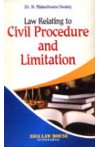- Author(s): Dr. N. Maheshwara Swamy
- Publisher: Asia Law House
- Edition: 1 Ed 2016
- ISBN 13 9789385556883
- Approx. Pages 464 + contents
- Format Paperback
- Delivery Time Normally 7-9 working days
.........................................................................................................................
Description
It is an established history that during the British Rule in India, various measures were undertaken either to introduce new laws and policies or to reform the existing laws in the Indian legal system. One of the major reforms witnessed during that period was to bring uniformity in procedures and practices to be followed in the administration of justice, throughout the then British Indian territories, by the adjudicatory bodies. Codification of Civil Procedure was the harbinger of such exercise. Reformation of the Code of Civil Procedure has become a continuous process even after bringing into force the present Code of Civil Procedure, 1908, (for short hereinafter referred to as the "CPC"). The present CPC has been amended, from time to time, in order to update the law, be suiting the changing needs, inter alia, of Indian socio-economic and cultural ways of life of the citizens. The CPC is not only a normative but also a procedural piece of law made applicable throughout India, except, inter alia, the State of Jammu and Kashmir. It has come into force on the first day of January 1909. It provides procedure for filing of various suits, applications, appeals, reference, reviews and revisions, etc, along with the procedure for processing and disposal of the same by the Courts of law, in matters of civil nature. What is a matter of civil nature is a question of fact as well as law. The CPC contains a two-dimensional procedure, namely, Section-wise provisions spread over in XI Parts, comprising of Sections 1 to 158 and Rule-wise provisions comprising of 51 Orders in all, as shown in the Schedule. It has been shape*d with a hidden thread to bind and bring inseparable nexus between certain parts of sectional provisions and the Rules envisaged in the pertinent Orders, which are in fact arranged in a dispersed manner, in such a way that a conjoint reading of both types of provisions is a sine qua non for invoking and enforcing the law in its given spirit and letter. Such an arrangement of the provisions of law two-dimensionally, has become one of the major
.........................................................................................................................
Contents
Part 1 Historical Background, Introduction and essentail features of code of Civil Procedure,
1908, Jurisdictionof Courts, Institution of Suits and Caveat Petitions
Part 2 Pleadings and Procedure for Processing of Civil Suits
Part 3 Procedure for Apperances and Examination of Parties, Recording of Evidence and trail of
Civil Cases
Part 4 Judments, Degrees and orders
Part 5 Procedure for Execution of Decrees and Orders
Part 6 Provisions Governing Appeals, Reference, Review and Revision
Part 7 Law Relating to limitation
Table of Cases
.........................................................................................................................
Author Details
Dr. N. Maheshwara Swamy Obtained Ph. D Degree in Law in 1992 from O.U. and Masters Degree in Labour Laws as well as International Law and Economics, P.G. Diploma in Industrial Relatiions and Personal Managemkent as well as in Intellectual Property Rights.
Author of more than 100 Research Articles published in various reputed law journals, such as AIR, SCJ, Lab, I.C., ACJ, LLN, ALT, ALD etc. and author of more than three dozen useful law books such as Law relating to Limitation, Law relating to Partnershipl, Law relating to Environmental Pollution & Protection etc.
Teacher of Law since 1985 with multidisciplinary experience.
Well-versed with Editing and writing of Digestive Notes & Head Notes of Judgments.
Practices as an Advocate at the High Court of A.P. during 1994-97.
Participated and presented papers in a Catena of National Seminars, Workshops etc.
Delivered extension lectures on invitation at various Institutions like A.P. Judicial Academy since 1995.
Extending free legal advice counselling to the needy.
.........................................................................................................................

